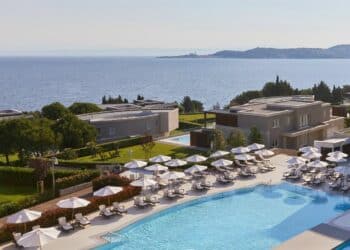
How would you describe Qatar’s hospitality market?
The hospitality sector has witnessed tremendous growth this year as a result of the developing infrastructure of entertainment, culture and leisure experiences, not to mention following the success of the FIFA World Cup Qatar 2022.
With new tourist attractions implemented all the time, visitors will surely return to Doha for a family holiday, couples’ retreat or business travel.
What are the industry’s most significant changes after the world cup?
There was a surge of visitors to Doha over the World Cup period, but since then, we have also seen growing inbound travel from around the region, mainly from the neighbouring GCC countries.
Doha was awarded the Arab Tourism Capital for 2023, which has gained exposure for the city as a leading provider of unique experiences and landmarks, from world-class shopping destinations to cultural icons such as the Qatar National Museum and Souq Waqif.
By blending the best hospitality with new and enriching experiences, the industry has seen growth in the number and diversity of offerings.
What does your property add to the industry’s hospitality scene (how does it elevate the country’s travel and tourism attractiveness?)
The hotel is located in the centre of Msheireb Downtown Doha, providing guests with an ideal opportunity to explore the city’s wide variety of dining experiences and arts and culture, just a short walk away from Souq Waqif.
The hotel consistently provides the high level of service and hospitality which Mandarin Oriental is renowned for globally, gaining the trust of discerning travellers as a result.
 Tell us more about your property’s unique location and offers.
Tell us more about your property’s unique location and offers.
Our 117 rooms, 41 suites and 91 serviced apartments are designed by the world-renowned David Collins Studio, fusing an elegant, contemporary design with subtle elements of traditional Qatari heritage.
The hotel’s ten dining outlets offer an inviting culinary experience, introducing unique flavours from worldwide destinations and focusing on classic local dishes and delicacies.
For an exclusive stay experience, MO Club provides guests in a Club Deluxe Room or Club Studio Suite with various benefits, including bespoke service, exquisite dining, tailored amenities and access to a private lounge.
The Spa at Mandarin Oriental, Doha, promises a relaxing and holistic approach to wellness, with 3,030 square metres holding six private treatment rooms, a couple’s suite, two VIP suites and extensive heat and water experiences, including two indoor pools.
 What are some of the biggest hospitality trends in Qatar right now?
What are some of the biggest hospitality trends in Qatar right now?
The market tends to value variety in travel options, whilst experiences should be personalised, considering each guest’s needs.
Growth in sustainable travel has also been evident, which aligns with our adherence to Mandarin Oriental’s group sustainability practices and vision, such as eliminating all single-use plastic, responsible procurement and supporting local producers.
What can be done in the country to support the growth of Qatar’s hospitality sector?
Those operating in the sector should focus on providing unique experiences that cater to every need, then renew and refresh them periodically to ensure relevance and momentum for growth.
What makes Qatar unique from its GCC neighbours from a travel and tourism point of view?
Qatar has proved itself an authentic cultural destination, holding on to its rich heritage whilst embracing modernity.
Visitors can also expect a variety of leisure activities available throughout the year to suit solo travellers or the entire family, making Qatar a perfect destination regardless of the occasion or season.
With destinations like Souq Waqif, the Qatar National Museum and the Museum of Islamic Art, visitors can expect world-class events, experiences and more that showcase the generosity and hospitality of the people of Qatar.


































































